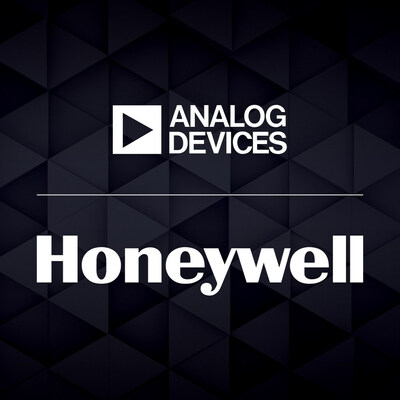Honeywell and Analog Devices Team Up to Drive Transformative Innovation, Beginning with Building Automation
- Digital connectivity technologies in building management systems will help reduce cost, waste, and downtime
Many of the commercial buildings in
"For more than a decade, ADI and Honeywell have collaborated on driving the next waves of innovation," said Martin Cotter, senior vice president, Industrial and Multi Markets and president of ADI EMEA region. "In this next phase of our work together, we are thrilled to see these ADI technologies move beyond factory automation and into Honeywell's building management system to help customers reduce building energy consumption, which can save money, improve resiliency, and help meet emissions reductions goals."
"Honeywell is revolutionizing building management systems to help building owners tackle today's biggest challenges," said Suresh Venkatarayalu, Honeywell's chief technology officer. "This collaboration with ADI would offer building owners the ability to upgrade and enhance their wiring without a significant upfront investment, and with less labor and environmental impact."
Honeywell plans to adopt ADI's single-pair Ethernet (T1L) and software configurable input/output (SWIO) solutions in its building management systems. ADI's single-pair Ethernet enables long-reach Ethernet connectivity with the possibility of reusing a building's existing wiring, reducing installation time and cost, and reducing waste. Single-pair Ethernet complements existing Ethernet connectivity in building management systems, bringing enhanced connectivity from the edge to the cloud, helping eliminate data islands and better utilizing assets.
ADI's offering would also reduce product complexities by enabling Honeywell to build a single version of the product for different needs, allowing more future-proofed control and automation for when a building is remodeled, or requirements change. This helps increase the speed of product installation, reduces inventory needs, and enables easier and more affordable changes.
About Honeywell
Honeywell is an integrated operating company serving a broad range of industries and geographies around the world. Our business is aligned with three powerful megatrends – automation, the future of aviation and energy transition – underpinned by our Honeywell Accelerator operating system and Honeywell Connected Enterprise integrated software platform. As a trusted partner, we help organizations solve the world's toughest, most complex challenges, providing actionable solutions and innovations through our Aerospace Technologies, Industrial Automation, Building Automation and Energy and Sustainability Solutions business segments that help make the world smarter, safer and more sustainable. For more news and information on Honeywell, please visit www.honeywell.com/newsroom.
About Analog Devices, Inc.
Analog Devices, Inc. (NASDAQ: ADI) is a global semiconductor leader that bridges the physical and digital worlds to enable breakthroughs at the Intelligent Edge. ADI combines analog, digital, and software technologies into solutions that help drive advancements in digitized factories, mobility, and digital healthcare, combat climate change, and reliably connect humans and the world. With revenue of more than
All trademarks and registered trademarks are the property of their respective owners.
(ADI-WEB)
Honeywell:
Dawn Wotapka
Director, External Communications
(631) 943-3782
dawn.wotapka@Honeywell.com
Analog Devices:
Ferda Millan
Global PR and External Communications
Analog Devices
Ferda.Millan@analog.com
Michael Lucarelli
Vice President, Investor Relations and FP&A
Analog Devices
Investor.Relations@analog.com
![]() View original content to download multimedia:https://www.prnewswire.com/news-releases/honeywell-and-analog-devices-team-up-to-drive-transformative-innovation-beginning-with-building-automation-302029743.html
View original content to download multimedia:https://www.prnewswire.com/news-releases/honeywell-and-analog-devices-team-up-to-drive-transformative-innovation-beginning-with-building-automation-302029743.html
SOURCE Honeywell








